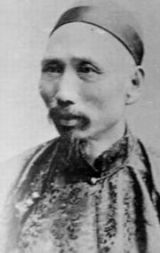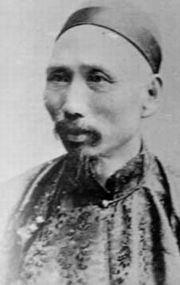
Ding Ruchang
Encyclopedia

Taiping Rebellion
The Taiping Rebellion was a widespread civil war in southern China from 1850 to 1864, led by heterodox Christian convert Hong Xiuquan, who, having received visions, maintained that he was the younger brother of Jesus Christ, against the ruling Manchu-led Qing Dynasty...
in 1854. But later he surrendered with Cheng Xuechi
Cheng Xuechi
Cheng Xuechi Taiping Rebellion general originally,with Taiping army‘s mate Ding Ruchang surrender to the Qing in Anqing in 1861. He was an eminent Han Chinese official, military Captain General of the late Qing Dynasty in China...
in the Battle of Anqing
Anqing
Anqing is a prefecture-level city in southwestern Anhui province, East China. It borders Lu'an to the north, Chaohu to the northeast, Tongling to the east, Chizhou to the southeast, and the provinces of Jiangxi and Hubei to the south and west respectively....
in 1861 and joined Li Hongzhang
Li Hongzhang
Li Hongzhang or Li Hung-chang , Marquis Suyi of the First Class , GCVO, was a leading statesman of the late Qing Empire...
as a cavalry
Cavalry
Cavalry or horsemen were soldiers or warriors who fought mounted on horseback. Cavalry were historically the third oldest and the most mobile of the combat arms...
man to fight against the Taiping Rebellion
Taiping Rebellion
The Taiping Rebellion was a widespread civil war in southern China from 1850 to 1864, led by heterodox Christian convert Hong Xiuquan, who, having received visions, maintained that he was the younger brother of Jesus Christ, against the ruling Manchu-led Qing Dynasty...
. In 1874, he protested against the Qing Dynasty
Qing Dynasty
The Qing Dynasty was the last dynasty of China, ruling from 1644 to 1912 with a brief, abortive restoration in 1917. It was preceded by the Ming Dynasty and followed by the Republic of China....
government's decision about reduction of the army size. He went back to his hometown to avoid being killed.
In 1875, he volunteered as the commander of the Qing Empire
Qing Dynasty
The Qing Dynasty was the last dynasty of China, ruling from 1644 to 1912 with a brief, abortive restoration in 1917. It was preceded by the Ming Dynasty and followed by the Republic of China....
's Beiyang Fleet
Beiyang Fleet
The Beiyang Fleet was one of the four modernised Chinese navies in the late Qing Dynasty. Among the four, the Beiyang Fleet was particularly sponsored by Li Hongzhang, one of the most trusted vassals of Empress Dowager Cixi and the principal patron of the "self-strengthening movement" in northern...
which fought the Battle of the Yalu River in the First Sino-Japanese War
First Sino-Japanese War
The First Sino-Japanese War was fought between Qing Dynasty China and Meiji Japan, primarily over control of Korea...
in 1894. He became a casualty of the battle from the opening shot of his own vessel, the Dingyuan, which had a construction defect, along with a number of officers also present on the bridge.
After Battle of the Yalu River, he ordered the Beiyang Fleet stay close to Liugong Island
Liugong Island
Liugong Island is a small islandlocated on the northeastern edge of Shandong Peninsula, China at the mouth of Weihai Bay. It is known as the "birthplace of China's first modern navy".-Geography:...
and wait reinforcements, after five months, it was clear that no reinforcements would be coming. By February 1895, the Beiyang Fleet commanded by Admiral Ding was facing total defeat. Admiral Ding committed suicide by handgun in his office at the Liugong Island
Liugong Island
Liugong Island is a small islandlocated on the northeastern edge of Shandong Peninsula, China at the mouth of Weihai Bay. It is known as the "birthplace of China's first modern navy".-Geography:...
headquarters. His deputy, Admiral Liu, after ordering that his warship be scuttled by explosives, also committed suicide by taking poison. The remnants of the Beiyang Fleet surrendered to the Japanese.
The only captain still alive then was the youngest, Sa Zhenbing
Sa Zhenbing
Sa Zhenbing KCMG was a prominent Chinese admiral. He lived through four governments in China, and had been appointed to various senior naval and political offices.-Early life:...
.
After his death, Admiral Ding was blamed by the imperial government for the defeat, and his family was only able to give him a proper burial in 1912 after the Xinhai Revolution
Xinhai Revolution
The Xinhai Revolution or Hsinhai Revolution, also known as Revolution of 1911 or the Chinese Revolution, was a revolution that overthrew China's last imperial dynasty, the Qing , and established the Republic of China...
overthrew the Qing dynasty.

